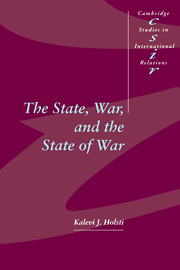Book contents
- Frontmatter
- Contents
- Preface
- 1 Thinking about war in international politics
- 2 Wars of the third kind
- 3 The formation of states before 1945
- 4 The creation of states since 1945
- 5 The strength of states
- 6 The perils of the weak: the state-strength dilemma
- 7 Wars of the third kind and international politics
- 8 Analyzing an anomaly: war, peace, and the state in South America
- 9 International responses to the weak state: managing and resolving wars of the third kind
- Appendix: Major armed conflicts by region and type, 1945–1995
- References
- Index
- CAMBRIDGE STUDIES IN INTERNATIONAL RELATIONS
6 - The perils of the weak: the state-strength dilemma
Published online by Cambridge University Press: 05 May 2010
- Frontmatter
- Contents
- Preface
- 1 Thinking about war in international politics
- 2 Wars of the third kind
- 3 The formation of states before 1945
- 4 The creation of states since 1945
- 5 The strength of states
- 6 The perils of the weak: the state-strength dilemma
- 7 Wars of the third kind and international politics
- 8 Analyzing an anomaly: war, peace, and the state in South America
- 9 International responses to the weak state: managing and resolving wars of the third kind
- Appendix: Major armed conflicts by region and type, 1945–1995
- References
- Index
- CAMBRIDGE STUDIES IN INTERNATIONAL RELATIONS
Summary
In classical and modern political thought, the state is the creation of some sort of community. In contract theories, for example, individuals band together to create a state in order to terminate life in a state of nature. In Hobbes's version, the contract is between individuals of the community and the Leviathan. In Rawls's modern version, individuals hidden behind a “veil of ignorance” congregate to create a just society and its governing apparatus.
From the perspective of this study, two interesting facts stand out in these accounts of state-creation. First, the authors do not bother to define who are members of the community. The community, as suggested in chapter 3, is assumed rather than made problematic. Second, in the act of state-creation, only members of the community are involved. Members of other communities – representatives of foreign states – have no role.
Contract metaphors for understanding the state-creation process after 1945 are inappropriate because the two assumptions, above, are incorrect. In post-1945 states, community cannot be assumed. It is the most problematic aspect of all new states, for most of them contain not a single community, but many. Nor was the act of state-creation primarily between members of a single community, or between those individuals and a Leviathan. Outside communities in the form of the metropolitan powers and the United Nations played significant and often crucial roles in laying the foundations of post-1945 states. Hobbes, Locke, and others wrote at a time when states remained relatively isolated. This condition did not prevail after World War II.
- Type
- Chapter
- Information
- The State, War, and the State of War , pp. 99 - 122Publisher: Cambridge University PressPrint publication year: 1996

